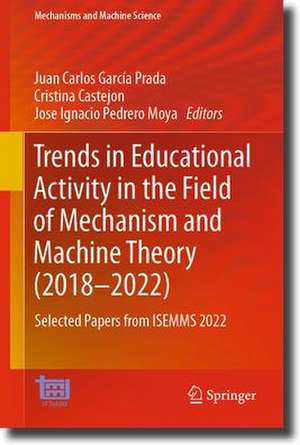Trends in Educational Activity in the Field of Mechanism and Machine Theory (2018–2022): Selected Papers from ISEMMS 2022: Mechanisms and Machine Science, cartea 128
Editat de Juan Carlos García Prada, Cristina Castejon, Jose Ignacio Pedrero Moyaen Limba Engleză Hardback – 11 iun 2023
| Toate formatele și edițiile | Preț | Express |
|---|---|---|
| Paperback (1) | 1185.51 lei 38-44 zile | |
| Springer Nature Switzerland – 11 iun 2024 | 1185.51 lei 38-44 zile | |
| Hardback (1) | 1386.17 lei 22-36 zile | |
| Springer Nature Switzerland – 11 iun 2023 | 1386.17 lei 22-36 zile |
Din seria Mechanisms and Machine Science
- 20%
 Preț: 817.43 lei
Preț: 817.43 lei - 17%
 Preț: 364.74 lei
Preț: 364.74 lei - 20%
 Preț: 1001.89 lei
Preț: 1001.89 lei - 18%
 Preț: 1268.55 lei
Preț: 1268.55 lei - 18%
 Preț: 945.79 lei
Preț: 945.79 lei - 18%
 Preț: 1275.65 lei
Preț: 1275.65 lei - 18%
 Preț: 1392.46 lei
Preț: 1392.46 lei - 18%
 Preț: 2142.21 lei
Preț: 2142.21 lei - 18%
 Preț: 1382.21 lei
Preț: 1382.21 lei - 15%
 Preț: 604.87 lei
Preț: 604.87 lei - 18%
 Preț: 1104.43 lei
Preț: 1104.43 lei - 18%
 Preț: 2768.05 lei
Preț: 2768.05 lei - 18%
 Preț: 1625.27 lei
Preț: 1625.27 lei - 18%
 Preț: 1872.30 lei
Preț: 1872.30 lei - 18%
 Preț: 899.21 lei
Preț: 899.21 lei - 18%
 Preț: 1550.30 lei
Preț: 1550.30 lei - 18%
 Preț: 1832.85 lei
Preț: 1832.85 lei - 15%
 Preț: 649.87 lei
Preț: 649.87 lei - 18%
 Preț: 950.52 lei
Preț: 950.52 lei - 18%
 Preț: 953.97 lei
Preț: 953.97 lei - 18%
 Preț: 959.19 lei
Preț: 959.19 lei - 18%
 Preț: 1217.10 lei
Preț: 1217.10 lei - 18%
 Preț: 1387.73 lei
Preț: 1387.73 lei - 18%
 Preț: 1218.21 lei
Preț: 1218.21 lei - 18%
 Preț: 1546.05 lei
Preț: 1546.05 lei - 18%
 Preț: 1550.30 lei
Preț: 1550.30 lei - 18%
 Preț: 1846.73 lei
Preț: 1846.73 lei - 18%
 Preț: 1538.34 lei
Preț: 1538.34 lei - 18%
 Preț: 1000.24 lei
Preț: 1000.24 lei - 18%
 Preț: 1397.82 lei
Preț: 1397.82 lei -
 Preț: 448.88 lei
Preț: 448.88 lei - 18%
 Preț: 1233.52 lei
Preț: 1233.52 lei - 18%
 Preț: 1547.31 lei
Preț: 1547.31 lei
Preț: 1386.17 lei
Preț vechi: 1690.45 lei
-18% Nou
Puncte Express: 2079
Preț estimativ în valută:
265.27€ • 275.27$ • 221.72£
265.27€ • 275.27$ • 221.72£
Carte disponibilă
Livrare economică 24 februarie-10 martie
Preluare comenzi: 021 569.72.76
Specificații
ISBN-13: 9783031257292
ISBN-10: 3031257294
Pagini: 264
Ilustrații: IX, 264 p. 146 illus., 125 illus. in color.
Dimensiuni: 155 x 235 mm
Greutate: 0.59 kg
Ediția:2023
Editura: Springer Nature Switzerland
Colecția Springer
Seria Mechanisms and Machine Science
Locul publicării:Cham, Switzerland
ISBN-10: 3031257294
Pagini: 264
Ilustrații: IX, 264 p. 146 illus., 125 illus. in color.
Dimensiuni: 155 x 235 mm
Greutate: 0.59 kg
Ediția:2023
Editura: Springer Nature Switzerland
Colecția Springer
Seria Mechanisms and Machine Science
Locul publicării:Cham, Switzerland
Cuprins
Plans for a Course on the History of Mechanisms and Machine Science.- Teaching concept for the practical application of product development and project management methods.- Guizzo Xp: a Robotic Toolkit for STEM Education and Raising Awareness of Aquatic Environment Protection.- Kinematical analysis and dimensional synthesis of RRPR-type four-bar mechanism in MMS study course.- Developing students' cognitive skills in MMS study course.- Robotic Systems as a Part of AI Fundamentals Course at ITS Academy Foundation for New Life Technologies n.a. Alessandro Volta in Trieste, Italy.- A distance teaching experience in gear design with Autodesk Inventor.- Flipped Classroom and Technology Enhanced Learning in Mechanical Engineering.- New formative evaluation methodology on rotating machinery diagnostics.- Has the Teaching Innovation Carried Out During the Pandemic Been Consolidated? DEM-UPC Subjects.- Application of reverse engineering to implement 3D designs of ancient mechanisms.- Implementation of Audiovisual Material in Lab Sessions during COVID Time: Effects and Results.- Flipped Learning Applied to Machine Design.- Influence of continuous assessment test methodology on the learning of basic mechanical physics knowledge.- Implementation of Projects Oriented Learning in Mechanical Engineering Universities and Vocational Colleges.- Learning how to design and manufacture by applying hot wire cutting to the fabrication of a car spoiler.- Methodological approach for interdisciplinary teaching of machines and mechanism in real contexts.- A European Researchers’ Night project on mechanical vibrations for high school students.- Matlab app for teaching planar mechanism kinematics.- Evaluation of audiovisual guides for laboratory classes in hydraulic machinery courses of distance learning engineering programs.- Dimensional Synthesis Approach of a Compliant Clutch Mechanism for a Formula Student Car (I).- Dimensional Synthesis Solution of a Compliant Clutch Mechanism for a Formula Student Car(II).- General-purpose software tools in teaching MMS.- The potential of education and training in additive manufacturing.
Textul de pe ultima copertă
This book presents content from the Third International Symposium on the Education in Mechanism and Machine Science (ISEMMS 2022). Among others, the chapters report on mechanical engineering education, mechanism and machine science in the mechanical engineer curricula, methodology, virtual laboratories and new laws. Special attention is given to MMS experiences in Pandemic times. The chapters discuss the current problems in MMS education with the aim of providing solutions and identifying appropriate trends for a modern world common vision in the Engineering education field.
Caracteristici
Provides the trends in mechanical engineering education Contains a comparative study of mechanical engineering curricula in different cultures Includes new educational methodologies
